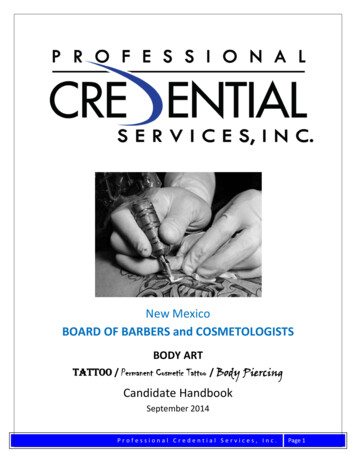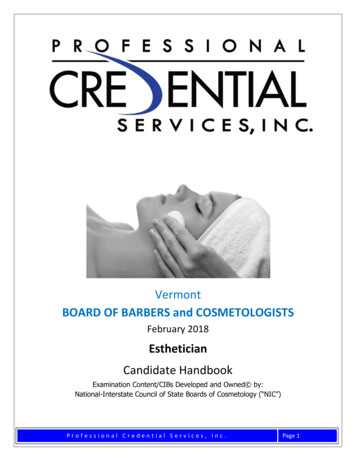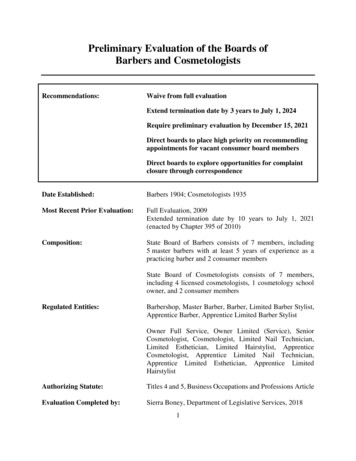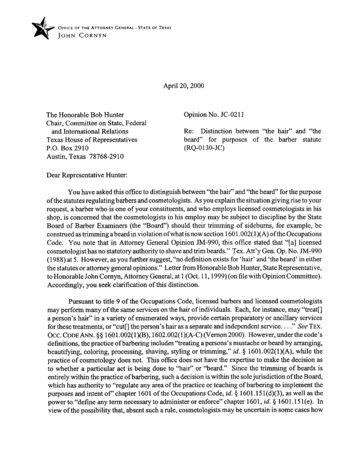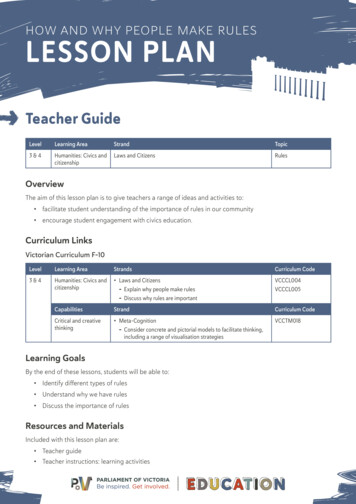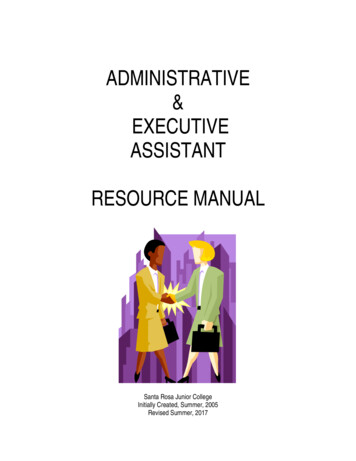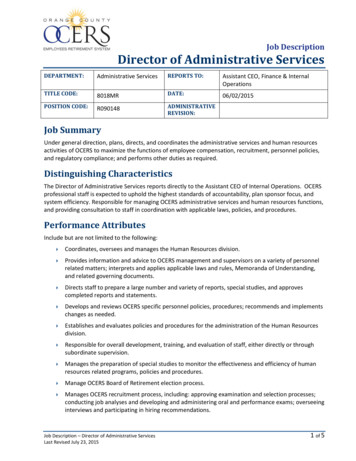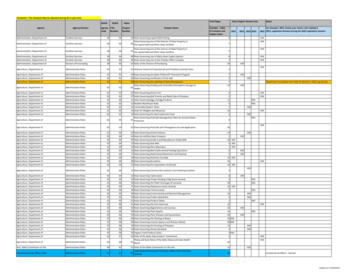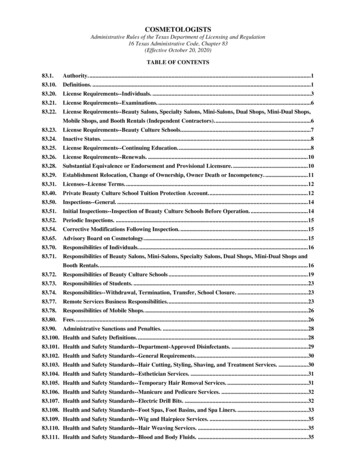
Transcription
COSMETOLOGISTSAdministrative Rules of the Texas Department of Licensing and Regulation16 Texas Administrative Code, Chapter 83(Effective October 20, 2020)TABLE OF CONTENTS83.1.Authority. .183.10.Definitions. .183.20.License Requirements--Individuals. .383.21.License Requirements--Examinations. .683.22.License Requirements--Beauty Salons, Specialty Salons, Mini-Salons, Dual Shops, Mini-Dual Shops,Mobile Shops, and Booth Rentals (Independent Contractors). .683.23.License Requirements--Beauty Culture Schools.783.24.Inactive Status. .883.25.License Requirements--Continuing Education. .883.26.License Requirements--Renewals. . 1083.28.Substantial Equivalence or Endorsement and Provisional Licensure. . 1083.29.Establishment Relocation, Change of Ownership, Owner Death or Incompetency. . 1183.31.Licenses--License Terms. . 1283.40.Private Beauty Culture School Tuition Protection Account. . 1283.50.Inspections--General. . 1483.51.Initial Inspections--Inspection of Beauty Culture Schools Before Operation. . 1483.52.Periodic Inspections. . 1583.54.Corrective Modifications Following Inspection. . 1583.65.Advisory Board on Cosmetology. . 1583.70.Responsibilities of Individuals. . 1683.71.Responsibilities of Beauty Salons, Mini-Salons, Specialty Salons, Dual Shops, Mini-Dual Shops andBooth Rentals. . 1683.72.Responsibilities of Beauty Culture Schools . 1983.73.Responsibilities of Students. . 2383.74.Responsibilities--Withdrawal, Termination, Transfer, School Closure. . 2383.77.Remote Services Business Responsibilities. . 2383.78.Responsibilities of Mobile Shops. . 2683.80.Fees. . 2683.90.Administrative Sanctions and Penalties. . 2883.100. Health and Safety Definitions. . 2883.101. Health and Safety Standards--Department-Approved Disinfectants. . 2983.102. Health and Safety Standards--General Requirements. . 3083.103. Health and Safety Standards--Hair Cutting, Styling, Shaving, and Treatment Services. . 3083.104. Health and Safety Standards--Esthetician Services. . 3183.105. Health and Safety Standards--Temporary Hair Removal Services. . 3183.106. Health and Safety Standards--Manicure and Pedicure Services. . 3283.107. Health and Safety Standards--Electric Drill Bits. . 3283.108. Health and Safety Standards--Foot Spas, Foot Basins, and Spa Liners. . 3383.109. Health and Safety Standards--Wig and Hairpiece Services. . 3583.110. Health and Safety Standards--Hair Weaving Services. . 3583.111. Health and Safety Standards--Blood and Body Fluids. . 35
83.112. Health and Safety Standards--Prohibited Products or Practices. . 3683.113. Health and Safety Standards--FDA. . 3683.114. Health and Safety Standards--Establishments. . 3683.115. Health and Safety Standards--Eyelash Extension Application Services. . 3783.120. Technical Requirements—Curriculum Standards. . 37
83.1.Authority. (Adopted effective December 8, 2005, 30 TexReg 8082)These rules are promulgated under the authority of the Texas Occupations Code, Chapters 51, 1602 and 1603.83.10.Definitions. (Adopted effective December 8, 2005, 30 TexReg 8082; amended effective March 1, 2006, 31 TexReg 1280; amendedeffective August 1, 2006, 31 TexReg 5952; amended effective October 11, 2007, 32 TexReg 7050; amended effective January 1, 2008,32 TexReg 9970; amended effective February 17, 2012, 37 TexReg 681; amended effective January 1, 2014, 38 TexReg 9520; amendedeffective July 1, 2014, 39 TexReg 4650; amended effective January 1, 2016, 40 TexReg 8759; amended effective January 15, 2018, 43TexReg 81; amended effective March 15, 2020, 45 TexReg 1693)The following words and terms, when used in this chapter, shall have the following meanings, unless the contextclearly indicates otherwise.(1)Act--Texas Occupations Code, Chapters 1602 and 1603.(2)Beauty Culture School--A cosmetology school, public or private that is subject to regulation underthe Act.(3)Board--The Advisory Board on Cosmetology.(4)Booth rental license--A license issued or renewed to an applicant the same time the applicant isissued one of the following license types: operator, manicurist, esthetician, esthetician/manicurist,eyelash extension specialist, hair weaver, wig specialist, instructor, or specialty instructor, whichallows the holder to lease space on the premises of a beauty shop, specialty shop, mini-salon, dualshop, or mini-dual shop to engage in the practice of cosmetology as an independent contractor.(5)Department--The Texas Department of Licensing and Regulation.(6)Commission--The Texas Commission of Licensing and Regulation.(7)Common Area--An area within a cosmetology establishment which contains equipment andfacilities available for use by all persons who practice cosmetology on the premises under a license,certificate or permit issued under this chapter or Texas Occupations Code, Chapter 1603.(8)Cosmetology establishment--A beauty salon, specialty salon, mini-salon, dual shop, mini-dualshop, mobile shop, or beauty culture school, public or private, that is subject to regulation under theAct.(9)Digital Network--Any online-enabled application, Internet website, or system offered or used by aremote service business that allows a client to arrange for a digitally prearranged remote service.(10)Digitally Prearranged Remote Service--A barbering or cosmetology service performed forcompensation by a person holding a license, certificate of registration, or permit under TexasOccupations Code, Chapter 1601, or 1602, or this chapter that is:(A)prearranged through a digital network; and(B)performed at a location other than a place of business that is licensed or permitted underTexas Occupations Code, Chapter 1601, 1602, or 1603.(11)Distance Education--A formal instructional process in which the student and teacher are separatedby physical distance and a variety of communication technologies are used to deliver instruction intheory to the student. Courses taught by distance education do not satisfy the requirements of thepractical portion of the course curriculum standards.(12)Dual Shop--A shop owned, operated, or managed by a person holding a dual barber and beautyshop license issued under Texas Occupations Code, Chapter 1603.(13)Eyelash Extension Application--The process of applying and removing a semi-permanent, threadlike, natural or synthetic single fiber to an eyelash, including cleansing of the eye area and lashesChapter 83, CosmetologistsPage 1-ROctober 20, 2020
prior to applying and after removing extensions.(14)Eyelash Extension Specialist--A person who holds a specialty license and who is authorized topractice the service defined in Texas Occupations Code §1602.002(a)(10).(15)Esthetician--A person who holds a specialty license and who is authorized to practice the servicesdefined in Texas Occupations Code §1602.002(a)(4) - (7) and (10). The term esthetician in thischapter includes the term facialist.(16)Esthetician/Manicurist--An esthetician/manicurist may perform only those services defined inTexas Occupations Code §1602.002(a)(4) - (10).(17)Guest Presenter--A person who possesses subject matter knowledge in specific curriculum topicsand who has the teaching ability necessary to impart the information to cosmetology students.Instruction is limited to the presenter’s area of expertise and a licensed instructor must be presentduring the classroom session in order for students to earn hours.(18)Hair weaver--A person who holds a hair weaving specialty certificate and who may perform onlythe practice of cosmetology defined in Texas Occupations Code §1602.002(a)(11).(19)Instructor--An individual authorized by the department to perform or offer instruction in any actor practice of cosmetology under Texas Occupations Code, §1602.002.(20)Law and Rules Book--Texas Occupations Code, Chapters 1602 and 1603, and 16 TexasAdministrative Code Chapter 83.(21)License--A department-issued permit, certificate, approval, registration, or other similar permissionrequired under Texas Occupations Code, Chapter 1601, 1602, or 1603.(22)License by substantial equivalence--A process that permits a cosmetology license holder fromanother jurisdiction or foreign country to obtain a Texas cosmetology license without repeatingcosmetology education or examination license requirements.(23)Manicurist--A manicurist may perform only those services defined in Texas Occupations Code§1602.002(a)(8) and (9).(24)Mini-Salon--A cosmetology establishment in which a person practices cosmetology under a license,certificate or permit issued under this chapter and which consists of a room or suite of rooms that isone of a number of connected establishments in a single premises that open onto a common hallwayor common area.(25)Mini-Dual Shop--A shop owned, operated, or managed by a person meeting the requirements ofboth a mini-barbershop and mini-beauty shop license under Texas Occupations Code §1603.207.(26)Mini-Salon Licensee--A person or entity that holds a license for a mini-salon or mini-dual shop.The mini-salon licensee shall be responsible for rules under Texas Occupations Code, Chapters1601, 1602, and 1603, and 16 TAC Chapters 82 and 83 for the mini-salon or mini-dual shop.(27)Mobile Shop--A beauty salon, specialty salon, or dual shop that is operated in a self-contained, selfsupporting, enclosed mobile unit.(28)Operator--An individual authorized by the department to perform any act or practice ofcosmetology under Texas Occupations Code, §1602.002.(29)Preparation--A substance used to beautify a person’s face, neck or arms or to temporarily removesuperfluous hair from a person’s body including but not limited to antiseptics, tonics, lotions,powders, oils, clays, creams, sugars, waxes and/or chemicals.(30)Provisional license--A license that allows a person to practice cosmetology in Texas pending thedepartment’s approval or denial of that person’s application for licensure by substantial equivalence.Chapter 83, CosmetologistsPage 2-ROctober 20, 2020
83.20.(31)Remote Service Business--A corporation, partnership, sole proprietorship, or other entity that, forcompensation, enables a client to schedule a digitally prearranged remote service with a personholding a license, certificate of registration, or permit under Texas Occupations Code, Chapters1601, 1602, or 1603.(32)Self-Contained--Containing within itself all that is necessary to be able to operate withoutconnecting to outside utilities such as water and electricity.(33)Safety Razor--A razor that is fitted with a guard close to the cutting edge of the razor that is intendedto prevent the razor from cutting too deeply and reduces the risk and incidence of accidental cuts.(34)Special Event--Includes weddings, quinceaneras, pageants, proms, debutante balls, birthdayparties, religious and cultural ceremonies, and on-stage performances.(35)Specialty Instructor--An individual authorized by the department to perform or offer instructionin an act or practice of cosmetology limited to Texas Occupations Code, §1602.002(a)(2), (4), (5),(6), (7), (8), (9), (10), and (11).(36)Specialty Salon or Specialty Shop--A cosmetology establishment in which only the practice ofcosmetology as defined in Texas Occupations Code, §1602.002(a)(2), (4), (5), (6), (7), (8), (9), (10),or (11) is performed. Specialty salons may only perform the act or practice of cosmetology in whichthe salon is licensed.(37)Student Permit--A permit issued by the department to a student enrolled in cosmetology schoolwhich states the student’s name and the name of the school.(38)Tweezing Technique--Any type of temporary hair removal procedure involving the extraction ofhair from the hair follicle by use of, but not limited to, an instrument, appliance or implement madeof metal, plastic, or other material.(39)Weaving--The process of attaching, by any method, commercial hair (hair pieces, hair extensions)to a client’s hair and/or scalp. Weaving is also known as hair integration or hair intensification.(40)Wet disinfectant soaking container--A container with a cover to prevent contamination of thedisinfectant solution and of a sufficient size such that the objects to be disinfected may be completelyimmersed in the disinfectant solution.(41)Wig Specialist--A person who holds a wig specialty certificate and who may perform only thepractice of cosmetology defined in Texas Occupations Code §1602.002(a)(2).License Requirements--Individuals. (Adopted effective December 8, 2005, 30 TexReg 8082; amended effective March 1,2006, 31 TexReg 1280; amended effective August 1, 2006, 31 TexReg 5952; amended effective October 11, 2007, 32 TexReg 7050;amended effective January 1, 2008, 32 TexReg 9970; amended effective February 17, 2012, 37 TexReg 681; amended effective January1, 2014, 38 TexReg 9520; amended effective January 1, 2016, 40 TexReg 8759; amended effective March 15, 2020, 45 TexReg 1693)(a)To be eligible for an operator license an applicant must:(1)submit a completed application on a department-approved form;(2)pay the fee required under §83.80;(3)be at least 17 years of age;(4)have obtained a high school diploma, or the equivalent of a high school diploma, or have passed avalid examination administered by a certified testing agency that measures the person's ability tobenefit from training;(5)have completed the following hours of cosmetology instruction at a licensed beauty culture schooleither:Chapter 83, CosmetologistsPage 3-ROctober 20, 2020
(6)(b)(A)1,000 hours of instruction in a beauty culture school; or(B)1,000 hours of instruction in beauty culture courses and 500 hours of related high schoolcourses prescribed by the department in a vocational or career and technical cosmetologyprogram in a public school; or(C)300 hours of instruction in cosmetology through a commission-approved training programin a beauty culture school and hold an active Class A barber certificate; andpass a written and practical examination required under §83.21.To be eligible for an esthetician, manicurist, or esthetician/manicurist specialty license an applicant must:(1)submit a completed application on a department-approved form;(2)pay the required fee under §83.80;(3)be at least 17 years of age;(4)have obtained a high school diploma, or the equivalent of a high school diploma, or have passed avalid examination administered by a certified testing agency that measures the person's ability tobenefit from training;(5)have completed the following hours of cosmetology instruction at a licensed beauty culture school:(6)(A)for an esthetician specialty license, 750 hours of instruction;(B)for a manicurist specialty license, 600 hours of instruction;(C)for an esthetician/manicurist specialty license; either:(i)1,200 hours of esthetician/manicure specialty instruction; or(ii)750 hours of esthetician instruction; and(iii)600 hours of manicure instruction; andpass a written and practical examination required under §83.21.(c)A person who holds both an active esthetician license and an active manicurist license is eligible for anesthetician/manicurist specialty license by submitting a completed application on a department-approvedform and paying the required fee under §83.80.(d)To be eligible for an eyelash extension specialty license an applicant must:(1)submit a completed application on a department-approved form;(2)pay the fee required under §83.80;(3)be at least 17 years of age;(4)have obtained a high school diploma, or the equivalent of a high school diploma, or have passed avalid examination administered by a certified testing agency that measures the person's ability tobenefit from training; and(A)have satisfactorily completed 320 hours of instruction in a department-approved eyelashextension application training program; and(B)pass a written and practical examination required under §83.21.Chapter 83, CosmetologistsPage 4-ROctober 20, 2020
(e)To be eligible for a hair weaving specialty certificate or wig specialty certificate an applicant must:(1)submit a completed application on a department-approved form;(2)pay the fee required under §83.80;(3)be at least 17 years of age;(4)have completed the following hours of cosmetology instruction at a beauty culture school:(5)(f)for a hair weaving specialty certificate, 300 hours of instruction completed in not less thaneight weeks from date of enrollment;(B)for a wig specialty certificate, 300 hours of instruction completed in not less than eightweeks from date of enrollment; andpass a written and practical examination required under §83.21.To be eligible for an instructor or specialty instructor license an applicant must:(1)submit a completed application on a department-approved form;(2)pay the fee required under §83.80;(3)be at least 18 years of age;(4)have a high school diploma or a high school equivalency certificate;(5)either hold an active operator license under this chapter for an instructor license or hold an activeesthetician, manicure, esthetician/manicure or eyelash extension license for an instructor specialtylicense; and(6)(g)(A)(A)have completed a course consisting of 750 hours of instruction in methods of teaching in alicensed private beauty culture school or a vocational training program of a publiclyfinanced postsecondary institution; or(B)either have at least one year of verifiable work experience as a licensed operator for aninstructor license or have at least one year of verifiable licensed experience in the specialtyin which the applicant is seeking licensure for a specialty instructor license; and(i)have completed 500 hours of instruction in cosmetology in a commissionapproved training program; or(ii)have completed 15 semester hours in education courses through an accreditedcollege or university within the 10 years before the date of application; or(iii)have obtained a degree in education from an accredited college or university; andpass a written and practical examination required under §83.21.To be eligible for a student permit an applicant must:(1)submit a completed application on a department-approved form; and(2)pay the fee required under §83.80.(h)A license application is valid for one year from the date it is filed with the department.(i)To operate a remote service business an individual must be licensed to practice cosmetology and must:Chapter 83, CosmetologistsPage 5-ROctober 20, 2020
(j)83.21.(1)in a manner prescribed by the department, notify the department of the intent to operate a remoteservice business;(2)provide a permanent mailing address; and(3)verify that the remote service business complies with the requirements of the Act and this chapter.The 86th Texas Legislature enacted changes to Chapter 1602, Occupations Code, reducing the number ofhours required for a Cosmetology Operator License from 1,500 to 1,000 hours. See House Bill 2847, 86 thLegislature, Regulation Session (2019), Article 14. The purpose of this transition rule is to provide guidanceon how to implement the transition from 1,500 to 1,000 hours.(1)Beginning January 1, 2020, the department may allow students enrolled on or after January 1, 2020in a 1,500-hour program to transfer hours towards a 1,000-hour program if the hours meet therequired technical standards. A student enrolling in cosmetology school on or after January 1, 2020may request to transfer completed hours of a 1,500-hour program towards an approved 1,000-hourprogram or to transfer to another school.(2)Upon request of a student enrolled on or after January 1, 2020, the school must apply hours earnedtowards a 1,000-hour program if the school has an approved 1,000-hour program or allow thestudent to transfer to another school. This rule expires on December 1, 2020.License Requirements--Examinations. (Adopted effective December 8, 2005, 30 TexReg 8082; amended effective March1, 2006, 31 TexReg 1280; amended effective August 1, 2006, 31 TexReg 5952; amended effective February 17, 2012, 37 TexReg 681;amended effective March 15, 2020, 45 TexReg 1693)(a)To be eligible for a department examination, an examinee must:(1)submit a completed license application on a department-approved form;(2)pay the applicable license fee under §83.80; and(3)have completed the number of hours required under this chapter and the Act.(b)A student enrolled in a 1,000-hour program is eligible to take the written examination when the departmentreceives proof of the student’s completion of 900 operator hours.(c)Applicants must pass the written examination before being eligible to take the practical examination.(d)When appearing for an examination, the examinee shall bring the instruments necessary to give a practicaldemonstration of cosmetology services or a practical demonstration of the services distinctive to his or herspecialty.(e)All department examinations consist of a written and practical part. A passing grade of 70 on each part isneeded to satisfy the examination requirement.(f)To be admitted to an examination, the examinee must present a current, valid government-issued photoidentification, which includes the applicant's full name and date of birth.(g)Examinees are required to wear closed toe shoes for the practical examination.(h)Models used in an examination are required to be at least 16 years of age. The department may requireparental approval for models under 18 years of age.83.22.License Requirements--Beauty Salons, Specialty Salons, Mini-Salons, Dual Shops, Mini-Dual Shops,Mobile Shops, and Booth Rentals (Independent Contractors). (Adopted effective December 8, 2005, 30 TexReg8082; amended effective March 1, 2006, 31 TexReg 1280 amended effective August 1, 2006, 31 TexReg 5952; amended effective October11, 2007, 32 TexReg 7050; amended effective January 1, 2008, 32 TexReg 9970; amended effective December 15, 2010, 35 TexReg10956; amended effective July 1, 2014, 39 TexReg 4650; amended effective January 1, 2016, 40 TexReg 8759; amended effectiveJanuary 15, 2018, 43 TexReg 81; amended effective March 15, 2020, 45 TexReg 1693)Chapter 83, CosmetologistsPage 6-ROctober 20, 2020
(a)To be eligible for a beauty salon, specialty salon, dual shop, mobile shop, mini-salon, mini-dual shop, orbooth rental license, an applicant must:(1)obtain the current law and rules book;(2)comply with the requirements of the Act and this chapter;(3)submit a completed application on a department-approved form; and(4)pay the fee required under §83.80.(b)In addition to the requirements of subsection (a), an applicant for a dual shop or mini-dual shop must alsocomply with Texas Occupations Code, Chapters 1601, 1602, and 1603 and 16 TAC Chapters 82 and 83 forobtaining a beauty salon license and a barbershop permit.(c)In addition to the requirements of subsection (a), a mobile shop license applicant must:(d)83.23.(1)provide a permanent physical address from which the mobile unit is dispatched and to which themobile unit is returned when not in use;(2)provide a permanent mailing address where correspondence from the department may be received;and(3)verify that the mobile shop complies with the requirements of the Act and this chapter.To operate a remote service business, a beauty salon, specialty salon, dual shop, mobile shop, mini salon, ormini-dual shop must:(1)in a manner prescribed by the department, notify the department of the intent to operate a remoteservice business;(2)provide a permanent mailing address; and(3)verify that the remote service business complies with the requirements of the Act and this chapter.License Requirements--Beauty Culture Schools. (Adopted effective December 8, 2005, 30 TexReg 8082; amendedeffective March 1, 2006, 31 TexReg 1280; amended effective August 1, 2006, 31 TexReg 5952; amended effective October 11, 2007, 32TexReg 7050; amended effective February 17, 2012, 37 TexReg 681; amended effective January 15, 2018, 43 TexReg 81; amendedeffective March 15, 2020, 45 TexReg 1693)(a)To be eligible for a beauty culture school license, an applicant must:(1)obtain the current law and rules book;(2)comply with the requirements of the Act and this chapter;(3)submit a completed application on a department-approved form; and(4)one of the following:(5)(A)for a private beauty culture school, pay the applicable license and inspection fees requiredunder §83.80 and any required fee under §83.40; or(B)for a public beauty culture school, pay the applicable inspection fee required under §83.80;andfor a private beauty culture school, provide a current financial statement prepared by a certifiedpublic accountant. If the financial statement is more than 180 days old, an applicant must alsoprovide a supplemental financial statement within 180 days of the application.Chapter 83, CosmetologistsPage 7-ROctober 20, 2020
(b)A beauty culture school must be inspected and approved by the department prior to the operation of theschool.(c)Private beauty culture schools offering instruction for persons seeking a license or certificate must have andmaintain the following:(d)(1)a building of permanent construction that must include two separate areas, one area for instructionin theory and one area for clinic work, and that must also include access to permanent restroomsand adequate drinking fountain facilities;(2)adequate space, equipment, and instructional materials to provide quality classroom training to thenumber of students enrolled;(3)proof of ownership of building or proof of a lease for the first 12 months of operation; and(4)a copy of the certificate of approval for the curriculum standards approved by the department foreach course offered.Public beauty culture schools must have and maintain the following:(1)Adequate space to provide quality classroom training for the number of students enrolled includingan office, dispensary, classroom and laboratory space;(2)adequate equipment and instructional materials required by the department; and(3)a copy of the certificate of approval for the curriculum standards approved by the department foreach course offered.(e)A beauty culture schools offering instruction for persons seeking a license or certificate must comply withall health and safety standards established by this chapter.83.24.Inactive Status. (Adopted effective
the practice of cosmetology defined in Texas Occupations Code §1602.002(a)(11). (19) Instructor--An individual authorized by the department to perform or offer instruction in any act or practice of cosmetology under Texas Occupations Code, §1602.002. (20) Law and Rules Book--Texas Occupations Code, Chapters 1602 and 1603, and 16 Texas



